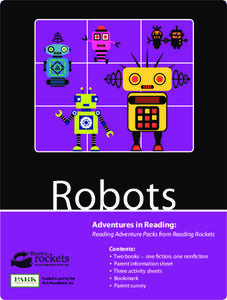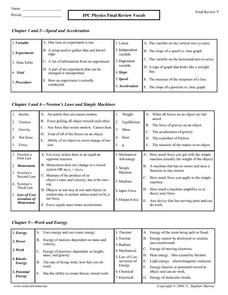Curated OER
Quiz on Work, Force and Energy
In this work, force and energy learning exercise, students complete an on-line quiz, choosing questions and matching answer. A printable version is available.
CPO Science
Physics Skill and Practice Worksheets
Stop wasting energy searching for physics resources, this comprehensive collection of worksheets has you covered. Starting with introductions to the scientific method, dimensional analysis, and graphing data, these skills practice...
Curated OER
Technology Benchmark
Students examine examples of writing samples from NCS Mentor and discuss with students what makes each writing piece earn points. They grade a writing sample on the program and discuss various simple machines and their components.
Curated OER
Fulcrums in Our Body
Second graders discuss fulcrums and levers and identify at least two fulcrums and levers on their bodies. They also identify fulcrums and levers on animal bodies.
Curated OER
Catapult Unit
Learners understand the need for carefully defining the problem before searching for a solution. They understand the need for carefully defining the problem before searching for a solution. Students compare a variety of catapults and the...
Curated OER
Agriculture in Motion
Sixth graders research machines used in agriculture. In this agriculture lesson, 6th graders complete a variety of activities that involve farming and crops. Some examples include: answering questions, creating a storyboard, poetry, and...
Curated OER
Can You Find the Difference?
Students create their own balance to determine a difference in the weight (and composition) of cents made in different years.
Curated OER
TE Activity: Choosing a Pyramid Site
Students determine how engineers decide on choices for final designs and sites for construction. They look at a surveyor's report while they evaluate sites where a pyramid could be build. They consider the distance the pyramid would be...
PBS
Reading Adventure Pack: Robots
Two activities work with a fiction and nonfiction book about robots‚—Robot Dreams by Sara Varon and Robot by Roger Bridgman. Scholars read each story, then build a robot out of found objects, examine robot sensors, and search for...
Curated OER
Creating a Simple Telegraph Machine
Young scholars experiment and discuss circuits and how they work. In this science instructional activity, students construct a telegraph machine using cardboard, wires, battery, electric tape and masking tape. They investigate what...
Student Handouts
Graphic Organizer: Reference Citations
Pupils practice researching sources and logging citation information with this graphic organizer. After posing a general topic, groups of students are asked to devise general questions about that topic, and to research sources that they...
Curated OER
Moving Along With Simple Machines: Introduction
Students observe examples of gravity, friction, and force on the playground. They then experiment and participate in a variety of activities in centers back in the classroom.
Teach Engineering
Tools and Equipment (Part 1)
Looking for the best inclined plane for the job? Groups calculate the theoretical mechanical advantage for four different inclined planes. They determine the actual mechanical advantage by measuring the amount of force needed for the...
Science Matters
Energy Transfer and Transformation
When you take a simple task and create an exceptionally difficult way to complete it, it is known as a Rube Goldberg machine. These machines are filled with many types of energy transfers and energy transformations. Here, pupils watch...
Teach Engineering
Force on a Current Carrying Wire
What do electrical currents have to do with an MRI? Using a simple wire setup and a magnet, class members explore forces used in an MRI by investigating the magnetic force acting on a wire carrying a current.
CK-12 Foundation
Ramp and Piano
Can you lift a piano into a truck? Simulation allows scholars to explore the relationship between force, ramp length, and weight. Pupils control the variables of truck bed height, ramp length, weight of piano, and the number of friends...
CK-12 Foundation
Block and Tackle
Can you easily lift more than your own weight? With a pulley system, almost anyone can manage this challenge. Scholars adjust the mechanical advantage (number of pulleys), weight of object being lifted, and the length of rope pulled. The...
Center for Math and Science Education
Pocket Solar System
How in the world can something as big as the solar system possibly fit in your pocket? Complete this simple modeling activity and find out, as young scientists gain an appreciation for the incredible scale of outer space.
Curated OER
Science: Invent a Gadget
Third graders invent gadgets using simple machine principles. Once they have assembled graphic organizers containing information about their invention, they draw diagrams and explain how their gadget works. Lastly, 3rd graders write...
Curated OER
IPC Physics Vocabulary Review
In this physics review worksheet, students review vocabulary words associated with speed, acceleration, Newton's Laws and simple machines, work and energy, magnetism, electricity, and harmonic motion and light. This worksheet has 92...
Curated OER
Robotic Muscles
Students investigate how adding more pulleys affect the pulling power. In this physics lesson, students explain how pulleys work. They compare the work done by robots with and without pulleys.
Curated OER
Supersonic Spies
Students analyze a simple machine and use "reverse engineering" to create an exact replica. They interpret incomplete information to build a simple wheel-and-axle machine. Students discuss how building a machine activity correlates to...
Curated OER
Junkyard Wars: Air Movers
Learners study Rube Goldberg machines. For this investigative lesson students design and build a machine that uses several steps to move an aluminum can.
Curated OER
Wheels and Axles 1
Students investigate how and why wheels are used in different types of machines. They work in teams trying to move a heavy box with and without dowels and discuss which way is easier to move the box. Next, they conduct an experiment...

























